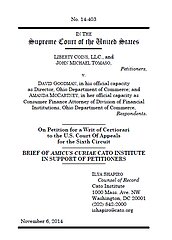Liberty Coins, LLC v. Goodman
Learn more about Cato’s Amicus Briefs Program.
Under Ohio law, it isn’t illegal to buy gold, it isn’t illegal to sell gold, and it isn’t illegal to talk about buying and selling gold. But—and it’s a significant “but”—if you talk about buying gold, you’re not allowed to actually buy any. At least not without a license. That’s right: in Ohio, it’s illegal for anyone who advertises a willingness to buy gold to do so without a license. Obtaining and maintaining that license isn’t easy, or cheap. Licenses must be renewed every year, and license holders have to make daily reports to the police detailing their purchases. This law creates a two‐tiered system: dealers who have complied with the onerous licensing regime may freely advertise their businesses, while others can’t so much as put up a sign reading “We Buy Gold” without facing criminal prosecution and fines of up to $10,000 per transaction. The Supreme Court has said that these sorts of regulations are tantamount requiring a “license to speak”—which are universally reviled as violations of the First Amendment (although some do exist). That should have been the end of this case: laws restricting commercial advertising are only constitutional if they are narrowly tailored to serve a significant state interest. The Ohio law, however, because it targets speech instead of the behavior connected to the speech couldn’t possibly survive that test. And that’s exactly what the district court held in this case brought by a coin and precious‐metal business. Unfortunately, the U.S. Court of Appeals for the Sixth Circuit was less willing to follow the First Amendment, and reversed the district court. While that is bad enough in itself, the Sixth Circuit’s reasoning law is especially frightening. The court didn’t hold that Ohio’s law survived strict scrutiny under the First Amendment, but instead that the First Amendment didn’t apply. The Sixth Circuit found that an advertisement—a simple statement offering to buy gold—was “unprotected speech” beyond the scope of the First Amendment. Cato has filed an amicus brief urging the Court to take this case and reverse the Sixth Circuit’s erroneous conclusion about the nature of free speech. While there certainly are types of speech that are not protected by the First Amendment, such as incitement to violence and child pornography, the existing rule is that truthful commercial advertising is protected unless it advertises criminal conduct. It’s not a crime to buy gold in Ohio, so it shouldn’t be illegal to talk about buying gold, with or without a license. Upholding the Sixth Circuit’s rule—which allows states to freely prohibit speech about conduct which is only illegal if discussed in public—would deprive nearly all advertising of constitutional protection, undoing 70 years of jurisprudence in the process.
